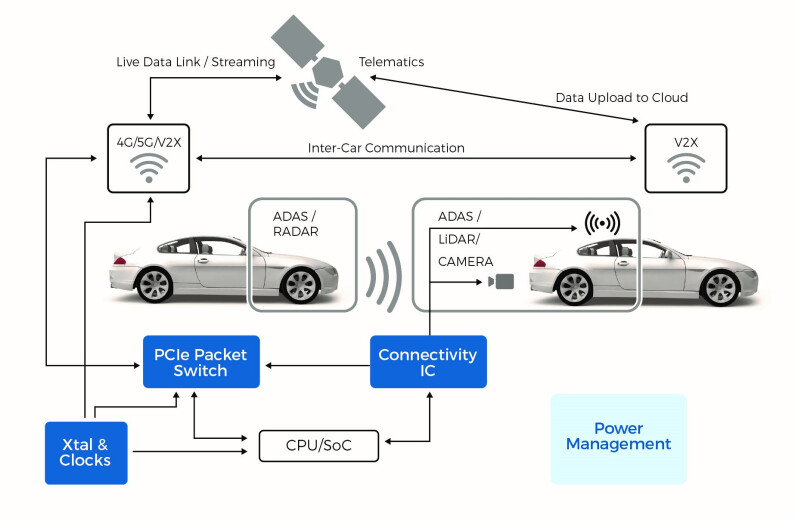Connected Cars Are Driving Innovation

By Simon Ramsdale, Analog Products – European and Automotive Marketing Manager
The Automotive marketplace is undergoing a revolution with respect to the connected car. For the industry it represents the integration of analysis and action, where local data is transformed into telematics, and driver assistance becomes ADAS. To the consumer it extends beyond this abstract definition of implementation; the connected car will help overcome some of the greatest real-life issues now facing drivers in built-up city environments, such as finding a parking space, adaptive navigation through busy streets, or using technology to avoid congestion on trunks roads between cities, along with increasing driver and pedestrian safety.
While connectivity will be fundamental to improving the overall experience and safety of all road users, the ultimate objective is the fully autonomous car, which can only be enabled through high-speed data communications.
With the continued evolution of Vehicle-to-Everything (V2X) communications – which includes Vehicle-to-Car, -Pedestrian, -Device and -Grid – fuelled by increased ADAS functionality, the volume of data being generated, transferred and processed within the car is increasing exponentially. The amount of data involved is staggering; some analysts estimate a single autonomous vehicle will generate in excess of 4GB of data per day but we can assume even a non-autonomous connected car will be reaching more than 1GB per day.
The existing communication channels developed for the automotive industry, such as CAN, FlexRay and MOST, will continue to provide the backbone for in-car communications but are not expected to handle the huge increase in time-critical data on their own. Adopting ADAS and autonomous driving will demand massive increases in processing performance, particularly when machine vision systems are used and, here, data throughout is crucial. In order to maintain that throughput the automotive industry is turning to the high-speed data buses and protocols that have emerged in response to faster networks and communication infrastructure, the types normally seen in High Performance Computing (HPC). This includes PCI Express (PCIe) and USB 3.x.
The ADAS data being generated and transferred typically needs to be processed in real-time, especially for lane change and blind spot detection systems. This relies on high-speed microprocessors being fed with a constant stream of data; one shortfall of many microprocessors and other devices is their restricted number of I/O ports and this is especially true for very high-speed PCIe ports.
This is changing the market dynamics within the automotive supplier market place. PCIe is relatively new in the automotive industry, so some traditional automotive suppliers aren’t able to meet this demand. This represents an opportunity for suppliers who are able to deliver, such as Diodes. Through its acquisition of Pericom, Diodes provides a full suite of Automotive PCIe products from packet switches, signal switches and crystal & clock generators. Diodes now offers the industry’s first AEC-Q100 qualified PCIe packet switch. Diodes’ range of PCIe and USB switches are ideal for automotive applications where microprocessors need an increased fanout, such as the 4-lane, 4-port PCIe 2.0 packet switch which allows one lane to connect to a host processor and three endpoints. These highly integrated devices are fully compliant with the PCIe standard and AEC-Q100 qualified, providing low latency non-blocking packet processing and forwarding. Its clock generators provides the clock signalling for the both the packet switch and microprocessors.
As the connected car becomes a high-speed data network it will need to drive signals over long data lines reliably, in an environment that is unlike the HPC domain. The latest USB 3.1 Gen 2 specification supports data rates of 10Gbps, for example, and at these data rates the signals can quickly become attenuated. Cable lengths within a car can easily reach six meters, so to overcome the attenuation and improve the reliability of the data transmitted, while maintaining high data rates, manufacturers are turning towards companies like Diodes to provide USB 3.2 Gen 2; devices that are capable of recovering and boosting the signal to drive it over long cable lengths.
Reliable high-speed data communications will be a part of every new vehicle’s infrastructure, supporting features such as ADAS and autonomous driving. This requires solutions that meet the requirements of strict qualifications, the commercial demands for leading manufacturers and the ever-increasing expectations of end users. Diodes is at the forefront of this technology and have the portfolio to help realise the vision of the fully autonomous, connected vehicle.